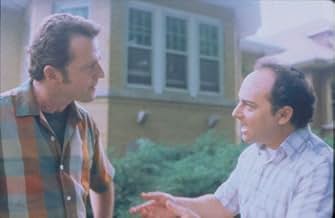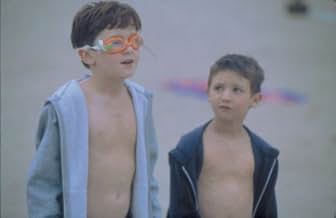CALIFICACIÓN DE IMDb
6.5/10
2.9 k
TU CALIFICACIÓN
Agrega una trama en tu idiomaA Catholic boy tries to convert a terminally ill Jewish boy, so he will be able to go to Heaven.A Catholic boy tries to convert a terminally ill Jewish boy, so he will be able to go to Heaven.A Catholic boy tries to convert a terminally ill Jewish boy, so he will be able to go to Heaven.
- Dirección
- Guionista
- Elenco
John Gleeson Connolly
- Roger O'Malley
- (as John Connolly)
- Dirección
- Guionista
- Todo el elenco y el equipo
- Producción, taquilla y más en IMDbPro
Opiniones destacadas
I just viewed Stolen Summer on DVD and this is a fine film for a first-time director. I am an avid movie watcher who likes everything from Kubrick to Kurosawa to Tarkovsky and it is easy to recognize that Pete Jones has incredible potential as a writer and filmmaker.
A touching story that was well acted, edited and paced. Even the child acting was fairly good. This was a very solid effort for a first-time feature on a tight budget.
Kevin Pollak is a very underrated actor.
Nice job all the way around! I hope we get to see more of Pete's stuff in the future.. it should be worth it.
A touching story that was well acted, edited and paced. Even the child acting was fairly good. This was a very solid effort for a first-time feature on a tight budget.
Kevin Pollak is a very underrated actor.
Nice job all the way around! I hope we get to see more of Pete's stuff in the future.. it should be worth it.
This movie was a wonderful movie until the last ten minutes when it falls completely flat on its face. The movie examines the unique and heartfelt friendship between the young son of an angry Irish Catholic and the young son of a Jewish Rabbi. Not only are the characters deeply explored, their differing faiths are thoughtfully examined throughout the film. It's a shame that the "powers that be" had to fold in the last ten minutes and give viewers bogus wishy-washy so-called theology that proves moviemakers are still afraid of moral absolutes. What a shame. Bonnie Hunt was so convincing as the dutiful wife and loving mother I wanted to adopt her. Kevin Pollak was incredible as the agonized father living with terminal illness.
This movie is beautifully written and simply acted, with wonderful performances from the child actors bringing it to life. It deals with subtle and complex issues of faith and love, parenting, friendship and flat-out chutzpah. The character of the Rabbi, played by Kevin Pollack, is a joy.
Stolen summer explores what faith means in action and who's got it right. Done from a child's questioning point of view it gets in to and away with some very tough and unresolvable issues. The kids treat the notion of getting in to heaven, whose God is right, what happens when you die- all as things you can actually ask about, and think about. The result is heartfelt and up to the end, wrenching in its honesty.
The final scene of the movie has absolutely no connection to the rest of story. Or rather, it seeks to tie up every single thread and gives you all those answers, revealing in the final two minutes the nature of prayer and the meaning of faith. Predictably it comes out as shallow and baffling. Where did the movie go? The actors are wrenched from any connection to any part of the story leading up to that moment and left doing a Hallmark card. The scene reeks of a desperate move to appeal to some research-specified demographic, the implausible act of an executive justifying his salary by telling the writer what the story needs.
Up until the Advent of Executives, this is a lovely movie, and a great story.
Stolen summer explores what faith means in action and who's got it right. Done from a child's questioning point of view it gets in to and away with some very tough and unresolvable issues. The kids treat the notion of getting in to heaven, whose God is right, what happens when you die- all as things you can actually ask about, and think about. The result is heartfelt and up to the end, wrenching in its honesty.
The final scene of the movie has absolutely no connection to the rest of story. Or rather, it seeks to tie up every single thread and gives you all those answers, revealing in the final two minutes the nature of prayer and the meaning of faith. Predictably it comes out as shallow and baffling. Where did the movie go? The actors are wrenched from any connection to any part of the story leading up to that moment and left doing a Hallmark card. The scene reeks of a desperate move to appeal to some research-specified demographic, the implausible act of an executive justifying his salary by telling the writer what the story needs.
Up until the Advent of Executives, this is a lovely movie, and a great story.
I thought Stolen Summer was competently done. The director, Pete Jones, was blessed with great performances from well known performers like Bonnie Hunt, Aidan Quinn, Kevin Pollak, and Brian Dennehy. The film explores the differences between Catholicism and Judaism seen through the eyes of a child. The child protagonist takes on the challenge of making sure a Jewish child goes to heaven. The story is set on the South Side of Chicago in the mid-70's and since I grew up in roughly that time I enjoyed the talk about the White Sox of that era. The authenticity overall is accurate, but the film lacks a spark. Watching an 8-year-old try to figure out some of the intricacies of life is a great idea for a story. I just think that the plot lacked any real surprises.
American films deal with all aspects of every day life: work, school, marriage, family, divorce, adolescence, sexuality, crime, alcoholism, drugs, disease, death - the range of subjects is virtually endless. Yet if you were to look to films to get some sense of what defines American culture, you would never know that religion played any kind of role at all in the lives of the common, ordinary citizen. Spirituality seems to be the one aspect of life that never gets acknowledged even by the most incisive of filmmakers. Of course, we do occasionally run across the serial killer who claims to be doing `the Lord's work' as he's butchering his victims, or the diabolical Catholic Church hierarchy plotting the deaths of hundreds to maintain its nefarious hold on its riches and power, or the sleazy evangelist who is out there bilking millions out of their life savings in exchange for a phony one way ticket to eternal glory. But we almost never see just plain garden-variety folks who go to church, value their faith and try to make their religion an intricate part of their workaday lives. Why is that?
Well, `Stolen Summer' is that rare American film which actually acknowledges that religion plays a key role in many people's lives. It's Chicago, 1976, and 8-year old Pete O'Malley, fearful of going to hell, is on a quest to assure his place in heaven by converting neighborhood Jews to the Christian faith. As part of his effort, he enlists the aid of a local rabbi who, admiring Pete's honesty and willingness to seek for Truth, agrees to let the boy set up a lemonade-cum-salvation stand outside his temple. The film deals with a wide array of characters, including members of Pete's family as well as the rabbi's, who have varying reactions to both Pete's stated goal and the burgeoning friendship between Pete and the rabbi's own son.
`Stolen Summer' is not afraid to confront the sectarian nature of religion that is often used as a means of dividing people of faith rather than bringing them together. Moreover, by viewing the world through the unfiltered eyes of these two innocent young boys, writer/director Pete Jones points up the empty ritualism that often defines how we adults choose to practice our faith. Pete and Danny, by cutting through the layers of nonsense and getting to the simple heart of the matter, force many of the grownups in the film to re-evaluate their own beliefs and practices.
It's also nice to see a family in a film that, although it has problems, is not thoroughly angst-ridden and dysfunctional. The O'Malley's are an intact Irish Catholic family whose eight children are a clear testament to the couple's adherence to papal decrees on birth control. In an excellent, multi-layered performance, Aidan Quinn plays Pete's father, Joe, a hard-working fireman who is proud of his ethnic roots and who feels that the most important role for a man in this world is to take care of his family. Yet, Joe has problems of his own. For one thing, he has an excessive sense of pride that prevents him from wanting his children to have a better life than the one he has made for them. He believes that his college-aged son should be content to work as a dutiful civil servant rather than pursue his dream of becoming a doctor. Moreover, Joe obviously fears what he doesn't know or understand and this comes out in subtle flashes of anti-Semitism, which put him in direct conflict with the rabbi and even his own son at times. Joe is, in many ways, the most interesting character in the film mainly because Jones is careful not to peg him as either a total hero or total villain. Bonnie Hunt and Kevin Pollack offer strong support as Joe's levelheaded wife and the open-minded rabbi, respectively. And young Adiel Stein scores big time as the centerpiece of the film, little Pete O'Malley. Stein conveys an upbeat childlike innocence that is infectious without becoming cutesy or cloying. He is utterly believable as a young boy coming-of-age in a suburban home in the 1970's.
`Stolen Summer,' because it deals gently with its people and its subject matter, may strike some as a bit too mild in tone, a bit too lacking in grit to be worth very much. And, in a sense, they may be right. The film does sometimes come off a bit like one of those `good for you' After School Specials designed to deliver an upbeat, heartwarming message about the goodness of mankind without unduly upsetting anyone in the audience. And the movie does feel a bit contrived at times, more concerned with wringing tears or teaching a lesson than it is in capturing life in its rawest form for all of us to see. But no matter. It's still a pleasure to see a film at least attempting to acknowledge both that people do think about religion and God from time to time in this world and that we all don't come from families torn asunder by personal trauma. Yes, one could perhaps wish for a bit more edginess at times - still, `Stolen Summer' merits praise for bringing religion back into the mainstream of American movies.
Well, `Stolen Summer' is that rare American film which actually acknowledges that religion plays a key role in many people's lives. It's Chicago, 1976, and 8-year old Pete O'Malley, fearful of going to hell, is on a quest to assure his place in heaven by converting neighborhood Jews to the Christian faith. As part of his effort, he enlists the aid of a local rabbi who, admiring Pete's honesty and willingness to seek for Truth, agrees to let the boy set up a lemonade-cum-salvation stand outside his temple. The film deals with a wide array of characters, including members of Pete's family as well as the rabbi's, who have varying reactions to both Pete's stated goal and the burgeoning friendship between Pete and the rabbi's own son.
`Stolen Summer' is not afraid to confront the sectarian nature of religion that is often used as a means of dividing people of faith rather than bringing them together. Moreover, by viewing the world through the unfiltered eyes of these two innocent young boys, writer/director Pete Jones points up the empty ritualism that often defines how we adults choose to practice our faith. Pete and Danny, by cutting through the layers of nonsense and getting to the simple heart of the matter, force many of the grownups in the film to re-evaluate their own beliefs and practices.
It's also nice to see a family in a film that, although it has problems, is not thoroughly angst-ridden and dysfunctional. The O'Malley's are an intact Irish Catholic family whose eight children are a clear testament to the couple's adherence to papal decrees on birth control. In an excellent, multi-layered performance, Aidan Quinn plays Pete's father, Joe, a hard-working fireman who is proud of his ethnic roots and who feels that the most important role for a man in this world is to take care of his family. Yet, Joe has problems of his own. For one thing, he has an excessive sense of pride that prevents him from wanting his children to have a better life than the one he has made for them. He believes that his college-aged son should be content to work as a dutiful civil servant rather than pursue his dream of becoming a doctor. Moreover, Joe obviously fears what he doesn't know or understand and this comes out in subtle flashes of anti-Semitism, which put him in direct conflict with the rabbi and even his own son at times. Joe is, in many ways, the most interesting character in the film mainly because Jones is careful not to peg him as either a total hero or total villain. Bonnie Hunt and Kevin Pollack offer strong support as Joe's levelheaded wife and the open-minded rabbi, respectively. And young Adiel Stein scores big time as the centerpiece of the film, little Pete O'Malley. Stein conveys an upbeat childlike innocence that is infectious without becoming cutesy or cloying. He is utterly believable as a young boy coming-of-age in a suburban home in the 1970's.
`Stolen Summer,' because it deals gently with its people and its subject matter, may strike some as a bit too mild in tone, a bit too lacking in grit to be worth very much. And, in a sense, they may be right. The film does sometimes come off a bit like one of those `good for you' After School Specials designed to deliver an upbeat, heartwarming message about the goodness of mankind without unduly upsetting anyone in the audience. And the movie does feel a bit contrived at times, more concerned with wringing tears or teaching a lesson than it is in capturing life in its rawest form for all of us to see. But no matter. It's still a pleasure to see a film at least attempting to acknowledge both that people do think about religion and God from time to time in this world and that we all don't come from families torn asunder by personal trauma. Yes, one could perhaps wish for a bit more edginess at times - still, `Stolen Summer' merits praise for bringing religion back into the mainstream of American movies.
¿Sabías que…?
- TriviaThis film was the result of Project Greenlight (2001), the first-time-director competition launched by Ben Affleck, Matt Damon, and Miramax, and was the subject of the HBO documentary of the same name, which aired in Winter 2002. The documentary revealed many behind-the-scenes snafus, which led to the mid-production firing of co-producer Jeff Balis.
- ErroresWhen Joe O'Malley and Patrick O'Malley are sitting together in the backyard, we see Patrick holding a beer. At the end of the scene, Patrick has no beer, and Joe is "ceremonially" handing him his first beer.
- Citas
Joe O'Malley: Baseball should be the only thing on an eight year old boy's mind.
- ConexionesReferenced in OWV Updates: Multimedia Update (08/01/2016) (2016)
- Bandas sonorasFRIEND
Written by Rick Butler and Kristin Mooney
Performed by Kristin Mooney
Published by Hookmeister Music (ASCAP) and Moonward Music (ASCAP)
Courtesy of Static Music
Selecciones populares
Inicia sesión para calificar y agrega a la lista de videos para obtener recomendaciones personalizadas
- How long is Stolen Summer?Con tecnología de Alexa
Detalles
Taquilla
- Presupuesto
- USD 1,800,000 (estimado)
- Total en EE. UU. y Canadá
- USD 134,736
- Fin de semana de estreno en EE. UU. y Canadá
- USD 61,613
- 24 mar 2002
- Total a nivel mundial
- USD 163,348
- Tiempo de ejecución1 hora 31 minutos
- Color
- Mezcla de sonido
- Relación de aspecto
- 1.85 : 1
Contribuir a esta página
Sugiere una edición o agrega el contenido que falta

Principales brechas de datos
By what name was Stolen Summer (2002) officially released in Canada in English?
Responda
































